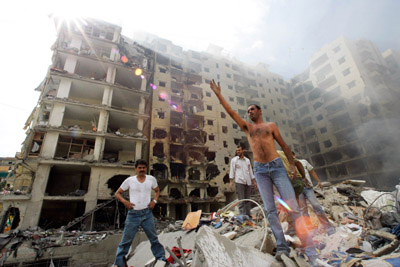JERUSALEM - After a stormy debate Sunday, Israel's Cabinet approved a Mideast
cease-fire, agreeing to silence the army's guns in less than 24 hours. The
Israeli military embarked on a last-minute push to devastate Hezbollah
guerrillas, rocketing south Beirut with at least 20 missiles.

A man shouts as he stands on the rubble of a
building destroyed after an Israeli air raid in a southern suburb of
Beirut August 13, 2006. [Reuters] |
The 24-0 vote, with one abstention, came a day after the
Lebanese government approved the agreement, and Hezbollah leader Hassan
Nasrallah gave his grudging consent. The truce was to take effect Monday
morning.
As the vote took place, Israeli shells slammed into the hard-hit Dahiyeh
suburb, a Hezbollah stronghold just south of Beirut, Lebanese television
stations said. Al-Arabiya said several buildings were destroyed.
Earlier Sunday, Israeli warplanes fired missiles into gasoline stations in
the southern port city of Tyre, killing at least ten people in those and other
attacks. Fierce ground fighting involving 30,000 Israeli troops continued in the
south, where Israel lost 24 soldiers Saturday, including five on a helicopter
shot out of the air by guerrillas.
In Jerusalem, a heated debate erupted during the Cabinet session, with
minister Ofir Pines-Paz criticizing the government's decision to order an
expanded ground offensive in the days before the cease-fire is to take effect.
Israeli Prime Minister Ehud Olmert immediately praised the Cabinet's
decision, saying "Hezbollah won't continue to exist as a state within a state."
"The Lebanese government is our address for every problem or violation of the
agreement," Army Radio quotes him as saying.
The cease-fire was to go into effect at 8 a.m Monday. After a halt in
fighting, some 15,000 Lebanese troops and an equal number of U.N. forces were to
be deployed in south Lebanon and create a Hezbollah-free zone, from the
Israel-Lebanon border to Lebanon's Litani River, some 18 miles from the border.
Israel said it hopes Lebanese troops will start deploying quickly, within a
week or two.
"When the Lebanese and multinational force enters, Israel will withdraw and
not before," Israeli Cabinet minister Yaacov Edri said after the Cabinet vote.
Former Defense Minister Shaul Mofaz abstained in the
vote, said a senior government official who spoke on condition of anonymity.